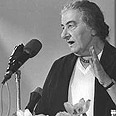
Tormented. Golda Meir (archives)
צילום: הרמן חניתה, לע"מ
Hardest job in the world
Op-ed: Being PM in Israel, the country of intrigue, is much more difficult than being US president
I think it was Golda Meir who said, "Whoever wants to be prime minister in Israel – deserves it," but she still accepted the Mapai veterans' request that she serve as premier. The body of the previous prime minister, Levi Eshkol, was still on the second floor of the house on Ramban Street in Jerusalem when the senior Mapai members gathered on the first floor and decided that Golda would be the successor. A tormented Golda accepted the party's "verdict."
Anyone who chooses politics as a career and way of life wants to eventually become prime minister. The road is long, difficult and filled with struggles and suffering. In most cases, those who do land the job are worn out and rigid. They've gone through so much on the way to the top.
You don't have to love or hate a prime minister to belittle his or her statements, actions, failures and achievements. My late colleague Zeev Schiff once said, "You can't succeed in this position. The best you can do is not fail." An objective observer will say that being prime minister in Israel is the most difficult and demanding job in the entire world.
In the entire world? Yes, in entire world. The president of the United States, for instance, deals with a small fraction of the problems the prime minister of Israel has to tackle. The American system of government is designed in such a way that many of the problems are solved before they even reach the White House. Thus, the president intervenes and leaves his mark on central, sometimes historic issues.
President Bill Clinton would sign only two or three documents a week. A machine took care of the hundreds, maybe even thousands of other documents that required the president's signature.
In addition, the US president does not deal with personal issues or internal disputes of political wheelers and dealers, and he does not waste time trying to find jobs for influential party activists or their associates.
But the PM's main responsibility is to make fateful political, diplomatic and security-related decisions, sometimes within minutes. In the US such decisions reach the president's desk after months or even years of research by the relevant government agencies. The US president eventually has to decide on whether the army will attack Iran's nuclear installations, but the Israeli PM has to deal with the seating arrangements at a dinner party for an American senator or the leader of Bolivia, among other things.
With all due respect, the US is not facing an existential threat, and the death of soldiers or civilians in a country of 300 million people is not as traumatic as it is in Israel, where everyone knows everyone else.
In Israel the prime minister bears sole responsibility for issues related to diplomacy and defense, and he can sometimes see the results of his decisions in the newspapers the next morning.
In Israel, the country of intrigue and disputes, the chance that a prime minister's decision will be hailed by everyone is slim. There will always be someone who will question it. Competent prime ministers will try to remove the obstacles before making the decision, but usually they can't find the time because they have to deal with the demands and requests of every low-level wheeler and dealer.










